alicia holbrook
Since the launch in June 2016 APMG's Public-Private Partnerships Certification Program has grown from a concept into a globally adapted program. PPP's involve many stakeholders which is reflected the diverse cross-section of the professionals who have achieved certification. Engineers, ministerial advisors, consultants, accountants and lawyers are just a few of the roles who have benefitted from the certification program. South Korea leads the way, with the highest number of exams taken, but the program has been truly global - check out our infographic for the highlights:

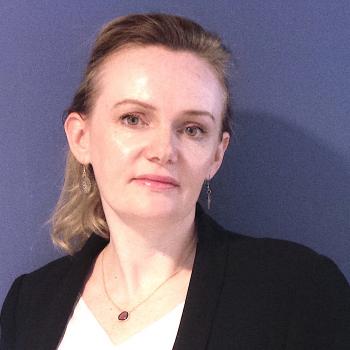
Alicia Holbrook
As Head of Marketing for APMG International I work closely with the World Bank Group, the MDB's and the PPIAF to help PPP professionals access best practice information.
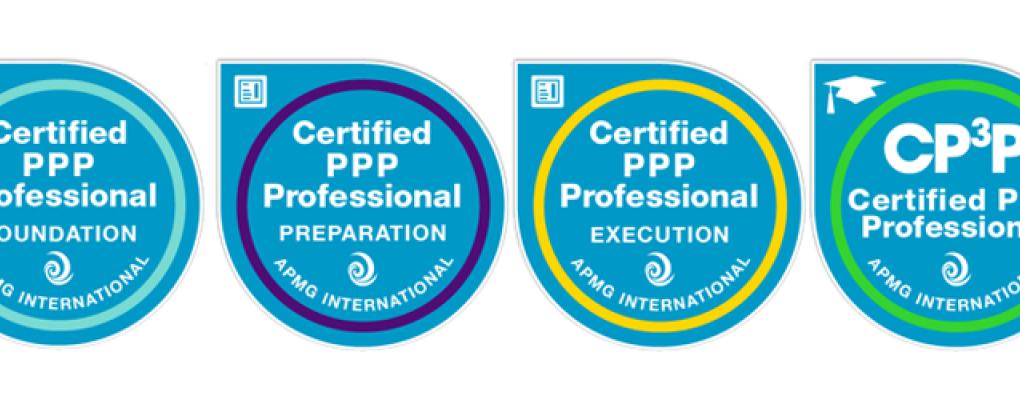
Claim and share your digital badges on social media and add them to your online CV and email signature to broadcast your certified skills to employers and other interested parties.
Successful candidates can now claim a digital badge to embed on an email signature, website, social media platforms or a digital CV. With just one click employers, clients, customers and other interested parties can easily view and verify credentials and skills.
To deliver the digital badges, APMG has partnered with Acclaim, a global leader who supply open badges for a wide range of academic institutions and global businesses. Candidates accessing their website badges on the Acclaim platform can also access labour market insights data which tags skills earned from the certification to available jobs searchable by location, employer, and salary range. Applying for a job is just a few clicks away.
Open badges are secure digital representations of credentials. Through a single click employers can verify the certification and learn more about the qualification.
Digital badges are available for the Foundation, Preparation and Execution exams. Candidates who have passed all three exams can claim an additional CP3P badge to demonstrate their Certified Public-Partnerships Professional credential. This credential indicates to potential employers and peers an in-depth level of knowledge and competency of PPP best practice.
Share your success on social media
Candidates can also raise their profile and share their exam success by clicking on the Twitter, Facebook, LinkedIn and WeChat buttons in the candidate portal. Sharing your certification success demonstrates:
- You are committed to continual improvement
- Your skills are current
- You are a highly skilled PPP professional
How to claim your badge
To embed your digital badge simply log into the APMG candidate portal and click on the create badge button. This will take you to the Acclaim portal where you will be requested to set up an account in order to access your digital badge.

Alicia Holbrook
As Head of Marketing for APMG International I work closely with the World Bank Group, the MDB's and the PPIAF to help PPP professionals access best practice information.

The sixth language translation of the APMG Certified Public-Private Partnerships has arrived. Brazilian Portuguese is the latest translation to be added to the rapidly growing CP3P program which has certified almost 3000 professionals in over 100 countries.
The translation has been curated and approved by the InterAmerican Development Bank, as a part of the Bank’s effort to support the implementation of effective PPPs in Latin America. “The certification program is one of the most disruptive innovations in the context of MDB’s support of the use of PPP in a long time. It addresses the long-standing challenge of capacity building in emerging markets from a very innovative approach: creating a universal language and common ground so governments, investors and other stakeholders can understand each other, learn from each other and build, together, a common ground,” said Marcos Siqueira, PPP Senior Specialist of the Inter-American Development Bank.
“The Portuguese version will add professionals from some of the most active PPP markets in the world to a growing network that incorporates links every day. This will create and disseminate knowledge and good practices and ultimately promote IDBs vision of Improving Lives through better and effective infrastructure.”
South American training organisation Radar PPP says, “Brazil is a continental-size country. For instance, we have over 5,700 different public authorities at municipal level. And, due to a number of circumstances - such as fiscal crisis and, more recently, a rising concern about the quality of government spending - there is increased demand in private investment in public infrastructure. Because of this, the search for the knowledge that can be found in the PPP Guide has significantly increased in the past year. However, it was restrained by the language limitation and it’s outstanding that APMG International, together with the MDB’s, quickly managed to provide a solution to make to make the knowledge available for everyone,” said Guilherme Naves, Partner, Radar PPP.
The Brazilian Portuguese translation of Chapter 1 of the PPP Guide is a free downloadable resource to help candidates prepare for the foundation exam. Candidates can also choose to take the Foundation exam in Brazilian Portuguese.
“The Portuguese translation of the PPP Guide is another essential component of the PPP Certification program. The combined efforts of APMG, Inter-American Development Bank and the World Bank to bring this translation to market, reflect our commitment to the smart and sustainable use of PPPs in Brazil,” said Abha Joshi-Ghani, Senior Advisor, Head of infrastructure, Analytics, and Programs, World Bank Group.
The PPP Certification Program comprises three examinations: Foundation, Preparation and Execution. The Foundation exam is a pre-requisite for sitting the two higher level exams. Candidates who sit all three exams can collect their CP3P digital badge to share on social media demonstrating they are a Certified PPP Professional.
To receive further updates on the PPP Certification Program, please subscribe to our newsletter via the PPP website (https://ppp-certification.com/) or follow our LinkedIn page (https://www.linkedin.com/showcase/apmg-public-private-partnerships/)
About the PPP Guide
The PPP Certification Guide is an innovation of the Asian Development Bank (ADB), the European Bank for Reconstruction and Development (EBRD), the Inter-American Development Bank (IDB), the Islamic Development Bank (IsDB), the World Bank Group (WBG) and part funded by the Public-Private Infrastructure Advisory Facility (PPIAF) with a shared vision of enhancing PPP performance globally.
About APMG International
APMG International is an award-winning, global examination institute that offers a broad portfolio of professional certifications for knowledge-based workers. APMG certifications are designed to provide professional career development for individuals, equipping them with the skills, knowledge, tools and techniques to help them and their organizations perform more effectively.
In addition, APMG provides accreditation services for individuals and organisations around the world that provide high quality training and consultancy services in support of our certifications.
Committed to quality, APMG’s certification and accreditation processes are developed and managed in accordance with a robust quality management system accredited by the United Kingdom Accreditation Service (UKAS). Visit: www.apmg-international.com

Alicia Holbrook
As Head of Marketing for APMG International I work closely with the World Bank Group, the MDB's and the PPIAF to help PPP professionals access best practice information.

The Certified Public-Private Partnerships Professional (CP3P) program celebrates its second year by fulfilling its vision of fostering a common minimum level of knowledge and understanding, plus provide certification for practitioners engaged in PPPs.
Since the inauguration of the scheme in June 2017 over 4000 candidates from 125 countries have taken an APMG PPP Certification Program exam. One of the main goals of the program is to share best practice knowledge and make it freely available to everyone. The PPP guide is now available in eight languages to make it accessible to even more PPP practitioners.
Demand for best practice information across all stages of the PPP cycle has been huge. Over 1 million visitors have downloaded or accessed the PPP Guide online, which uses principles and models to convey knowledge across a range of subjects including planning and funding, tendering, contracts, operating and maintaining projects.
Feedback from the global PPP community has been overwhelmingly positive with many candidates commenting that the program has led to an improved approach to PPPs. Fang Wei works on the development and management of PPP projects in Latin America. Wei successfully passed all three exams earlier this year and has been awarded a CP3P certificate. He commented on the scheme, “the certification has helped me to understand how to structure projects and consider risk allocation, to think and learn in a systematic way through the overall knowledge framework. I will apply the PPP knowledge to my daily work to help me in the PPP project development.”
“The APMG PPP Certification Program has made a positive impact to the professional development and career prospects of thousands of individuals across the globe,” says Richard Pharro. “Becoming a CP3P professional demonstrates to stakeholders and employers that you have the underpinning knowledge needed for the successful deliver PPPs.”
There has been a strong global demand for training across the PPP lifecycle including private finance banks, government departments and construction companies. This year Accredited Training Organisations have trained candidates working for a variety of organisations including the International Trade Center, Guateng Infrastructure Financing Agency, Road and Highway Department, Bangladesh, VIVEKA, Hyundai Engineering and Construction Co, Orange Business Services and K-Water.

Alicia Holbrook
As Head of Marketing for APMG International I work closely with the World Bank Group, the MDB's and the PPIAF to help PPP professionals access best practice information.

The PPP Guide, a free downloadable resource to help candidates prepare for the PPP Certification Program, has been fully translated to Chinese. Chapter 6: Tendering and Awarding the contract, Chapter 7: Strategy, Delivery and Commissioning and Chapter 8: Operation and Feedback are the final chapters to be translated making the PPP Guide fully available in Chinese.
The vision of the APMG Certification Program and PPP Guide is to foster a common minimum level of knowledge and understanding, plus provide certification for practitioners engaged in PPPs.
The PPP Certification Program comprises three examinations: Foundation, Preparation and Execution. The Foundation and Preparation exams are already available to sit in the Chinese language and work is underway to translate the Execution exam.
Fatouma Toure Ibrahima, Manager of the Infrastructure Programs and Analytics unit of the World Bank, said, “With this Chinese translation, the PPP Certification Program is now available in eight languages, addressing the growing need for high-quality knowledge-sharing about PPPs. In particular, the launch of Chinese version is a significant milestone: this is the first time the complete PPP Guide and all three exams have been translated into a non-English language, expanding the outreach to China and other countries in Asia.
We’re very proud to provide the leading training program that strengthens global capacity to design and implement sustainable PPPs. Countries around the world need more resources to build modern, reliable infrastructure to meet their citizens’ needs—and reach climate change goals. Part of this puzzle is ramping up the private sector’s involvement, responsibly.”
"The Institution of Public Private Partnerships is to promote exchange of PPPs knowledge for the Belt and Road Initiative and the PPPs market in China for which it is gaining ground since 2014. We found the World Bank Group’s PPP Certification Program CP3P can substantially provide the PPP practitioners with the Body of Knowledge of PPPs underlying principles and invaluable experience in the delivery of PPP projects worldwide”, said Walter Chan, Chairman, The Institution of Public Private Partnerships.
“We believe the members of the Institution can benefit from participating the PPP Certification Program CP3P to attain a proper level of PPPs knowledge and understanding. With this inspiration in mind, the Institution of Public Private Partnerships was determined to translate the PPP Program Guide into Chinese to share the PPPs knowledge for the members and the PPP practitioners in China. We hope the PPP Certification Program CP3P in China will be the definitive credential to demonstrate to the peers in the world that the participant’s abilities are aligned with international PPP good practice," Chan says.
“Over 4250 exams have been sat and feedback from candidates has been overwhelmingly positive. There has been specific interest in the certification program from China, which is a global leader in PPPs. The Chinese translations are intended to support all Chinese PPP practitioners and those working in PPPs such as lawyers, advisors or those who would like to pursue a career in PPPs. Becoming CP3P demonstrates to peers and employers that you have specialist knowledge,” says Richard Pharro, CEO, APM Group.
Since the launch of the PPP Certification Program in English, the PPP Guide has also been translated into Spanish, French, Portuguese, Japanese, Russian and Serbian.
To access chapters of the PPP Guide in Chinese, click here: https://ppp-certification.com/chinese-ppp-guide
About the PPP Guide
The PPP Certification Guide is an innovation of the Asian Development Bank (ADB), the European Bank for Reconstruction and Development (EBRD), the Inter-American Development Bank (IDB), the Islamic Development Bank (IsDB), the World Bank Group (WBG) and part funded by the Public-Private Infrastructure Advisory Facility (PPIAF) with a shared vision of enhancing PPP performance globally.
Since the inauguration of the scheme in June 2017 over 4000 candidates from 125 countries have taken an APMG PPP Certification Program exam. One of the main goals of the program is to share best practice knowledge and make it freely available to everyone. The PPP guide is now available in eight languages to make it accessible to even more PPP practitioners.
Over 1 million visitors have downloaded or accessed the PPP Guide online, which uses principles and models to convey knowledge across a range of subjects including planning and funding, tendering, contracts, operating and maintaining projects.

Alicia Holbrook
As Head of Marketing for APMG International I work closely with the World Bank Group, the MDB's and the PPIAF to help PPP professionals access best practice information.

Imad Fakhoury, the Director of Infrastructure Finance, PPPs & Guarantees Global Practice at the World Bank gave a video statement congratulating to the IIGF Institute for becoming the first government entity to be an accredited training organisation.
Here's the full transcript:
We are part of the bank that along with other multilateral development bank partners, PPIAF and APMG have worked to develop the CP3P certification.
I want to heartily congratulate the IIGF Institute as it becomes an accredited trainer for the certification. The certification trainings have reached over 50 countries but this is the first time any government has taken a step to move this expertise in-house. This achievement underlines Indonesia’s position at the forefront of promoting Indonesia’s standardised best practice for public private partnerships. It’s timely in the context of your presidents five year new plan that focuses on increasing private capital smartly and carefully for infrastructure.
We understand that more than 150 of your government officials have been trained. 100 more will be trained this year. We look forward to hearing about your progress and expect to learn from your experience. Congratulations for this pioneering effort in Indonesia.

Alicia Holbrook
As Head of Marketing for APMG International I work closely with the World Bank Group, the MDB's and the PPIAF to help PPP professionals access best practice information.

Since 1990 China has committed $193,701 billion to PPPs and has 1,655 projects reaching financial closure. PPPs in China are amongst the most ambitious in the world, enabling the successful delivery of complex projects inluding Guangzhou-Shenzhen Superhighway, Zhangzhou Houshi Power Plant and the Hangzhou - Shaoxing - Taizhou Railway.
To support Chinese PPP practitioners and help them to foster a common level of knowledge, the PPP Guide, which is the body of knowledge for the APMG Certification program was translated into Chinese in 2019. We are now delighted to announce that all three exams for the APMG CP3P Certification Program—Foundation, Preparation and Execution—are available in Chinese.
The APMG Certification Program informs candidates about the key principles and models of PPP projects. Candidates who successfully pass all three exams are awarded a CP3P digital badge which demonstrates to employers they have the skills and knowledge to act as an informed member of a PPP team.
The Chinese PPP Guide is a free downloadable resource to help candidates prepare for the PPP Certification Program and an excellent reference for all elements of the PPP cycle including finance models and contracting best practice. Over 1.25 million visitors have accessed the guide among all its language versions.
“The launch of the CP3P exams in Chinese is an important milestone,” said Imad Fakhoury, Director of Infrastructure Finance, PPPs & Guarantees at the World Bank “While the Foundation exam has been translated into seven languages, this is the first time all three exams and the complete PPP Guide have been translated.” He continued, “We’re pleased to know that our work to establish consistent good practices in PPPs will benefit practitioners in China as well as in other countries.”
“We published the Chinese translation of the PPP guide last year and it has quickly become one of our most in-demand translations. China is globally recognised as a leader in PPPs delivering ambitious infrastructure projects. The APMG PPP Certification Program supports Chinese PPP practitioners to deliver best practice on the full PPP lifecycle to deliver maximum value for money. The Chinese translations of the CP3P exams will help Chinese PPP practitioners demonstrate their skills to employers and act as an informed member of a PPP team,” says Richard Pharro, CEO, APM Group.
To access chapters of the PPP Guide in Chinese and to book an exam, click here: https://ppp-certification.com/chinese-ppp-guide

Alicia Holbrook
As Head of Marketing for APMG International I work closely with the World Bank Group, the MDB's and the PPIAF to help PPP professionals access best practice information.
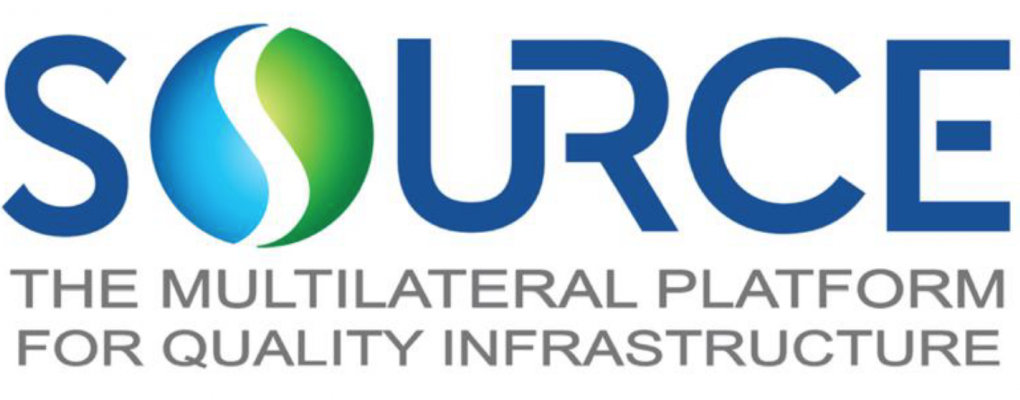
APMG International and Sustainable Infrastructure Foundation (SIF) have signed a Memorandum of Understanding (MoU) for the APMG PPP Certification Program.
SIF, a not-for-profit Swiss foundation headquartered in Geneva, coordinates the provision of SOURCE, the multilateral platform for quality infrastructure, it is now aligned with the APMG PPP Guide on project preparation, facilitating public agencies to take sound decisions and better allocation of resources.
The standardized templates available on SOURCE include the APMG PPP Guide’s best practices across all project preparation stages in tooltips and checklists. While SOURCE is a multilateral platform regularly updated with the latest international best practices, it can be adapted to local regulatory contexts and connected to existing country-specific management information systems.
By participating in an APMG PPP Certification Program and using SOURCE as a mechanism to prepare the case for sustainable infrastructure projects, public sector officials will obtain the following benefits :
Increased likelihood of developing and implementing a successful PPP program that delivers the right projects effectively and efficiently, providing Value for Money solutions for social infrastructure needs, and measuring progress on the Sustainable Development Goals and Paris Agreement via the SOURCE platform.
Facilitated access to global investors on SOURCE following internationally recognized best practices as set out in the PPP Guide, including the UK's Five-Case model, OECD’s PPP principles, IaDB's Sustainable Infrastructure Framework and the Global Delivery Challenges. Enabling governments to attract private sector participation in their PPP programs, while achieving Value for Money with a positive impact on society and the environment;
Reinforced knowledge transfer to public officials and their advisors from a vast pool of international PPP experience, and by sharing lessons-learned amongst organizations using the SOURCE platform.
Easier access to technical assistance from Multilateral Development Banks and affiliated international organizations via the “PPF Finder” functionality on SOURCE
Improved quality of project preparation thanks to the “Consistency Checks” functionality and the Global Infrastructure Hub (GIH)’s “PPP Risk Allocation Tool” embedded in SOURCE.
“PPP investors, financiers, construction companies, infrastructure operators, as well as advisors and consultants will also benefit from an appropriate understanding of infrastructure requirements in emerging markets via the SOURCE public pipeline once information is published by governments,” says Pierre Sarrat, Chief Operating Officer, SOURCE.
“This is a great partnership. APMG’s PPP Certification Program and the SOURCE platform will improve the capability of governments to fill the global infrastructure gap, not only by empowering public officials and their advisors to develop efficient and sustainable PPPs, but also by promoting private sector understanding and confidence in PPP programs, especially in developing economies,” says Richard Pharro, CEO, APMG International.
The PPP Certification Guide identifies the underlying principles and good practice elements that are applicable in most circumstances for emerging markets and developing economies, while recognizing local variations.
About the PPP Guide
The PPP Certification Guide is an innovation of the Asian Development Bank (ADB), the European Bank for Reconstruction and Development (EBRD), the Inter-American Development Bank (IDB), the Islamic Development Bank (IsDB), the World Bank Group (WBG) and part funded by the Public-Private Infrastructure Advisory Facility (PPIAF) with a shared vision of enhancing PPP performance globally.
Since the inauguration of the scheme in June 2017 over 5500 candidates from 125 countries have taken an APMG PPP Certification Program exam. One of the main goals of the program is to share best practice knowledge and make it freely available to everyone. The PPP guide is now available in eight languages to make it accessible to even more PPP practitioners.
Over 2 million visitors have downloaded or accessed the PPP Guide online, which uses principles and models to convey knowledge across a range of subjects including planning and funding, tendering, contracts, operating and maintaining projects.

Alicia Holbrook
As Head of Marketing for APMG International I work closely with the World Bank Group, the MDB's and the PPIAF to help PPP professionals access best practice information.

The first CP3P Professional level training course (Preparation level) in Russian language was organised by IFC, and delivered by PPP Experts Ltd,to the PPP Development Agency Ministry of Finance of the Republic of Uzbekistan.
Sarvar Tilabov, Leading Specialist, PPP Development Agency Ministry of Finance of the Republic of Uzbekistan commented upon the training, “We particularly value that apart from the skilful delivery of the CP3P syllabus to a 100% pass rate for both exams, the accredited trainer Sergey Samolis and his colleagues provided so much more valuable knowledge on PPPs, project finance and mega project management to the programme participants. Using in-depth local case studies, taking advantage of their profound experience in PPPs and making it a highly enjoyable and exciting experience, APMG CP3P training became an important factor for moulding the first generation of PPP professionals in Uzbekistan”.
Tilabov continues, “The understanding of PPPs and skills that the first cohort of CP3P professionals in Uzbekistan developed helped many of them in terms of career progress, putting them in critically important positions for the development of the PPP framework and driving first PPP projects in Uzbekistan. We are confident that the CP3P programme is the best vehicle for enhancing the public sector capacity for delivery of PPPs efficiently in our country.
Moreover, we admire how quickly and efficiently IFC, PPP Experts, and APMG rose to the challenge of the COVID-19 crisis and enabled the online competition of the CP3P Preparation training and exam for the Government of Uzbekistan”, says Tilabov.
In 2019-2020 all 42 delegates from Uzbekistan successfully passed the CP3P Foundation exam, and 19 of them also completed successfully the Preparation training and passed the exam. Accredited Trainer Sergey Samolis said, “The APMG Certification Program has proved to be a valuable tool for building PPP capacity in emerging markets. We delivered Russian language CP3P training courses of the first two levels to circa 150 participants from Kazakhstan, Kyrgyzstan, Russia, Ukraine and Uzbekistan with 100% exam success rate. Now that the Execution level materials are also available in Russian, we hope to see many fully certified PPP Professionals in Eastern Europe and Central Asia.”
One of the Preparation course participants with prior PPP experience - Remir Mukumov was Senior Advisor to the Minister of Finance, who put together two learning cohorts and provided valuable insights during the Uzbekistan Preparation level training, linking the CP3P Guide recommendations with the context of Uzbekistan PPP framework and nascent projects pipleline. "It is really rewarding to see the CP3P learning almost instantly used by course participants in real PPP projects," says Mukumov. He continues, "For each course the trainer and candidates establish chat groups, which stay very much alive after the course is over. We respond to our graduates' questions, they share career updates, discuss PPPs and look for work opportunites. Basically, it is a vibrant international community of Russian-speaking certified PPP professionals."
“The adoption of the APMG PPP Certification Program in Russian will go far to help practitioners deliver maximum value for money throughout the PPP lifecycle,” said Imad Fakhoury, Director of Infrastructure Finance, PPPs & Guarantees at the World Bank. He continued, “We’re pleased to know that our work to promote consistent good practices in PPPs continues to expand globally.”
All three levels for the APMG PPP Certification Programme are available in Russian language thanks to the efforts of IFC, who contracted PPP Experts Ltd to do the adaption into Russian language, in cooperation with the Swiss SECO and Austrian BMF. The PPP Guide, a FREE downloadable resource, is now fully available in Russian language to help candidates prepare for the PPP Certification Program.
The Execution exam is scheduled to be launched in 2020 which will complete the program, enabling Russian PPP practitioners to study all three levels of the program to become CP3P.
To access chapters of the PPP Guide in Russian and to book an exam, click here: https://ppp-certification.com/ppp-certification-guide/russian
To receive further updates on the PPP Certification Program, please subscribe to our newsletter via the PPP website (https://ppp-certification.com/) or follow our LinkedIn pages (https://www.linkedin.com/showcase/apmg-public-private-partnerships/ and http://linkedin.com/company/ppp-expertise-eurasia)

Alicia Holbrook
As Head of Marketing for APMG International I work closely with the World Bank Group, the MDB's and the PPIAF to help PPP professionals access best practice information.

We received several questions from delegates during the 'PPPs and Covid-19 Webinar.' The panel has provided the following written responses.
The full recording of the webinar is now available on YouTube.
Answers by Natalia Korchakova-Heeb, Managing Director SDG.17 Consulting GmbH, leader PPPHealth4All
Q. What are the business opportunities in post-Covid world?
A. The business opportunities in post-Covid world are connected to:
1) Digitalization. Successful businesses will have a combination of resilience and agility and will have to digitalize their services wherever is possible and this is also applicable to the public partners. Digitalization of processes and creation of digital services will be more and more in demand and I personally see a lot of business opportunities especially for PPPs in the healthcare sector. Digitalization of processes in PPPs in the healthcare sector improves availability and 24/7 monitoring, so reducing unavailability risk.
2) Use of new technologies for PPPs. New technologies (e.g. artificial intelligence, blockchain, big data, drones, BIM/ digital twins for PPP infrastructure projects) enhance the resilience and create new business opportunities. The benefits include improved performance and cost reductions.
3) Innovative PPPs. As far as the health sector is concerned, the investments in digitalization of healthcare projects are often undertaken with PPPs. PPPs are applied for m-health, e-health, telemedicine and health information technologies.
I have also mentioned today in my presentation that more multi-stakeholder approaches are necessary during and after COVID-19 pandemic to mobilize stakeholder ecosystems in the case of emergency or a need to provide a quick response. "Platform-approach" and “platform" as a service is a new business trend.
Answers by David Baxter, International Development Consultant, PPP Navigator
Q. Will risk assessment reverse cost of PPPs?
A. It will be increasingly important to revisit risk allocation and make sure that it is allocated to the relevant party - the one part that can mitigate this. If allocated to the wrong party there is a great risk of failure and then an increase in project cost. It will be important to revisit what is meant by force-majeure as well and who is responsible for a catastrophic force-majeure event impacts. In the current situation where both the public and private sectors are impacted it might not be wise to allocate it to one party, especially in Black-Swan events. It will be important to clearly define what a pandemic is so that it can be addressed in all existing contracts. The onus cannot be placed on the private sector on its own as they are reeling from impacts. PPP projects cannot fail because of bad force-majeure risk decisions on risk. There will be a cost to evaluate projects, but it will fix future problems. We need to revisit risk assessments and consider retro-reallocating them.
Q. What are mechanism for gov to support new projects?
A. We have two scenarios - short term - we need innovative procurements to address critical issues and needs now. In long term projects - there will be a need for revising projects and deciding which projects are a priority - we will need projects that offer value for money and consider People First PPPs. New feasibility studies that address Sustainability and resilience will be critical considerations for new PPP projects or they should not be considered.
Q. Do we have scenarios with Covid-19 situations? What are the implications?
A. We have short, medium, and long-term scenarios.
Short-term are the rescuing actions. This includes avoiding unnecessary disputes, setting up project round tables that are focused on solving problems and include solutions that are forward looking.
In the medium term we need to look at applying lessons learned, and revisiting enabling environments - are they conducive to mitigating future events,
In the long term we will need to revisit projects for commercial and economic viability. This means that future projects will have to have a people focus and must have elements of sustainability and resilience. In the long term governments will need to revisit their PPP projects and chose ones that carry merit in the post-covid-19 world. This will require the cumulative reallocation of the public and private sector resources towards meritorious projects.
Q. How can businesses help those suffering from the impacts of Covid-19?
A. There are a variety of PPPs that range from philanthropy to structured contractual agreements, Philanthropic partnerships can offer arrangements where companies (which have corporate social responsibility programs) can reach out to the public to help with recovery from the pandemic impacts. Formal PPPs have a great area for making impacts in healthcare and food security initiatives. It will be important to find innovative applications of technology through APPS that can improve food-supply chains, tracking of needs and delivery of essential services in partnerships between the public and private sectors. Innovation will also help create PPPs in countries like the USA where the healthcare system is privatized and not accessible for all. What would be important would be for the public and private sectors to come together to bridge investment and resources gaps by sharing resources and leveraging their expertise.
Q. What sectors would benefit the most from using PPPs in a post-covid-19 world?
A. It needs to be determined by country specific needs. They will need to be tied to countries specific SDGS. Education will be a big focus- especially in the area of delivering education remotely while students cannot attend classes. This will require the sharing of ideas and innovations of the private sector tech providers in partnership with public education systems. This will require collaborative PPPs where the resources of both parties are leveraged. In order to expedite such agreements during the pandemic, governments should explore ways to expedite procurement of projects to support critical PPP projects, in the heathcare, education, and WASH sectors. This could include developing prequalified pools of providers who have proven that they can be good PPP partners. Agricultural outreach programs that improve food security should be considered (i.e. strategic food storage warehouses). Supporting WASH projects and prioritizing them should be considered as bad sanitation will lead to the spreading of pandemic diseases. Until economies recover, more popular PPP projects such as transportation should be put on the back-burner. Affordability of projects will most certainly be a consideration that could also see mega-projects being put on hold.
Q. Do you see less appetite for emerging markets from investors and developers in the short and long term?
A. Investors will continue to be interested in projects that are well structured. Governments are going to have to do a better outreach to the private sector through market sounding to find out what types of PPP projects the private sector is interested in. The private sector will be watching how governments handle the crisis in their PPP markets and this will determine the private sectors interest in re-entering markets in the post-covid-19 era.
Q. What lessons are to be learned from the impact of the pandemic and what to do in future if faced with a similar situation? See combined response.
A. Current events have proven that most countries healthcare systems are not resilient to pandemic shocks due to poor integration of their healthcare systems - both nationally and internationally.
Healthcare preparation for shock events was non-existent and was under estimated in PPP force-majeure clauses in contracts.
What is critically needed are partnerships between the public and private sectors that address short-, medium-, and long-term challenges.
PPP recovery strategies should implement short-, medium-, and long-term phased actions that build on enduring partnerships that encourage robust relationships between stakeholders. We most certainly need to identify long-term corrective strategies that will address future Covid-19 type virus pandemics that many epidemiologists believe could become increasingly common due to long-term PPP contracts (20+ years)
We should explore building a holistic PPP healthcare ecosystem - at both national and international level for pandemic events
The longer the required commitment of the PPP partnership, the more formalized the relationship between the public and private sectors needs to be to ensure longevity.
In centralized national healthcare systems, partnerships should focus on creating healthcare enabling environments that allow the private sector to be meaningful partners and a back-up to the national healthcare system (e.g. private hospitals being incentivized to seamlessly align with national systems in a time of crises).
In privatized healthcare systems the focus would be different. In this case of the USA, for example, private hospitals could be incentivized to align themselves with the Veteran’s Hospital system as well as Department of Defense facilities in the case of national emergencies.
Stronger government led coordinated relationships supported by private sector innovators need to be established for existing and future project designing, planning, operations, and maintenance.
Longer-term and larger procurements (i.e. healthcare infrastructure) that are address ongoing long-term goals should undergo a more rigorous sustainability and resilience review that assesses them for value for money, commercial viability, and bankability.
All procurements should be competitive and transparent – with very few exceptions for emergency actions (this should apply to short-term actions only)
Flexible force-majeure requirements need to be included in PPP procurement terms and conditions so that healthcare PPPs are not exposed to punitive measures for missed deliverables which are not the fault of the operator
Reviews of long-term works, services, and goods must have an added filter that stringently applies sustainability and resilience into the required best practices
What is needed are robust and resilient PPP procurement systems that are flexible enough to respond to any unknown force majeure healthcare emergency.
It is important to avoid the current situation where institutions (both the public and private sectors) are pitted against each to procure emergency supplies and services “competitively.”
Answers by Marc Frilet, Managing Partner Frilet Société d’Avocats
Secretary of the UNECE PPP Center of Excellence Policies Laws and Institutions
Infrastructure and PPP expert French National Bar Council
Visiting professor Construction and Project Development University of Paris Pantheon Assas and Stuttgart
Q: Force majeure evolution In PPP; Who will be the beneficiary Public or Private?
A: Force majeure means that the loss lies where it falls and this may lead to drastic and inequitable consequences in PPP more particularly for Concession PPP. It is possible by contract to mitigate some negative consequence of force majeure. Many modern users fee PPP contracts for events like COVID permit to limit the private partner losses beyond a certain threshold by reference to the contract economic balance . The trend for restoring a minimum economic balance is guided by a joint interest of the PPP partners to continue to operate the public service in an equitable manner. No real winner or loser. Well drafted clause should permit to develop more resilient PPP.
Q: If dispute related to COVID how will local court will decide?
A: In practice very few PPP related disputes go to local court and I do not think that the Covid event will make exception. By nature many PPP projects which provide for public services cannot fail.
Renegotiation is the rule and modern approach to renegotiation by reference to the financial and economic viability of the project expressed simply with good indicators deserve to be considered in many PPP.
PPP contracts should better focus on dispute avoidance and make use of modern techniques .
The partnering process where representatives of the parties at different level meet on a regular basis around the table for exchanging in an organized and transparent manner on their respective views and issues on contract implementation is an efficient dispute avoidance tool.
For large and complex PPP Projects Dispute Boards comprising generally three authoritative person informed of all aspects of the project, exchanging with both parties and proposing equitable solutions to consider have a good track record for resolving disputes. It is recommended that the contract provides for Standing Boards meeting jointly the parties on a regular basis and providing advice even in the absence of Dispute.
When a dispute has crystallized PPP contracts should preferably refer the matter to arbitration administered by an experienced arbitration institution. Depending on applicable law and precedents additional reference may be made to equity or lex mercatoria.
Remember that with notable exceptions of some civil law countries local courts have very little experience and cannot rely on authoritative precedents on several cause of dispute specific to PPP.
Q: Many global multi-stakeholders platforms exist for PPP but it seems that none of theme is useful in reality. Are there any global or UN type platform to recommend?
I can mention the UNECE PPP Centre of Excellence program and related UNECE website. UNECE for several years now attempt to identify and promote the rules and best practices for developing resilient PPP meeting the SDG’s. UNECE promote the PfPPP delivery form to which I have contributed with the International PPP Centre of Excellence Policies Laws and Institutions. PfPPP for low and middle income countries is supported now by series of UNECE standards, best practices report and templates. Several of them have been endorsed by the UN member States and UNECE runs a program gathering State representatives and experts from around the world twice a year in Geneva.
Natalia also indicates good initiatives from WEF on how private sector help to combat COVID and she runs a platform on Healthcare PPP.
Q: What lessons learned for the design of flexible PPP contracts?
A: Many lessons have been learned already for the more complex and risky PPP contracts which are Concession PPP where the private partner recovers entirely or mostly from users fees. If the contract draws a wall between the parties allocating all identified risks in full to one or the other (ex-demand risk) there are many chances that the contract will become a pathologic PPP after few years .
Several modern best PfPPP contractual practices derives from the painful experience of the rigidity of many contracts mitigated by authoritative case law in civil law countries like France, Italy, Spain and Latin Amercica where according to UNECE over 2500 Concessions contracts are under way.
A UNECE program has addressed the PPP contracts flexibility issues digging into that bulk of experience leading to a list of inclusive contract clauses and guiding principles for Concession PPP for low and middle income countries .This document has been endorsed by the UN members States as recommended best practices .Several work stream toward the promotion of flexible and resilient PPP are under way.
Q: What advice to government in developing PPP market faced with fiscal limitation; How to use COVID 19 experience to better identify and develop projects within the fiscal crisis?
The fiscal crisis will further limit the potential to conclude PPP funded by public budgets.
It is worth to explore further how much it is possible to develop more contracts, which could trigger users fees in an acceptable manner for stakeholders. Several international development on the related methodology look promising. Of course users fee create some additional situations of risks and is unpopular in many circles but there are nowadays several possibilities to avoid, assign or share much better the risks such as COVID.
COVID may foster a real “partnership relationship” based on precedents inter alia from modern Concession PPP (PfPPP). The focus of such contracts start by the expression of common goals as part of the contract linked to set of clauses which permits to adjust some contractual obligation impaired by the disruptive events. This may include changing needs and scope of service for best continuity in the delivery of the service and satisfaction to end users. The contract sets the framework for a real partnership process having some flavor of company law. The practice has developed various set of economic and financial references to facilitate the making of such “collaborative decisions” when necessary.
Q: What are the lessons learned given the impact of the Pandemic? What to do different faced with similar situation in the future?
A: Allow me to propose a bullet point answer by referring to existing PPP contracts and more particularly on PfPPP which is the PPP delivery form initiated and developed by UNECE with the support of the PPP Specialized Centre of Excellence in Policy Laws and Institutions. The Center has produced several analysis, reports and templates related to sustainability and resilience of PPP focusing on the PPP contract itself and more precisely for contracts where the private party undertakes to design, build or rehabilitate, finance and operate a public infrastructure which is the support of a public service.
It is fair to say that so far such contracts are not equal when an unforeseeable event occurs preventing performance or rendering performance excessively onerous with the risk of bankruptcy of the private party.
Since PfPPP are designed to meet public needs represented in most cases by the delivery of an essential economic public service several jurisdictions around the world (from Napoleonic Civil law tradition) have developed pragmatic and authoritative case law principles for such « Public Contracts » ( in addition to traditional Force Majeure limited relief) by reference to the contract economic viability as anticipated by the parties upon contract signature and applying to PPP contracts. The case law generally refers to Hardship. Hardship together with several other equitable underlying principles for public contracts is an implied term which mitigates substantially the risks of the private party in case major change of the « economic landscape » while permitting to adapt the contract to new unexpected conditions of various kind. As such the private party facing an excessive loss endangering its survival can rely on Hardship and require the public Party to the contract to restore the « economic balance » of the contract up to a certain threshold notwithstanding the absence of contractual clause to this effect.
Concession PfPPP (ie situation where the private party undertakes to provide directly the service to end users and to recovers entirely or mostly from them) have been developed under the shelter of the above principles in Napoleonic Civil law countries. The parties to modern concession PPP have further developed in their contracts those underlying equitable principles inter alia by reference to the project economic and financial scenario updated in accordance with a Project Acccounting Plan and key economic indicators. Those provisions are becoming more and more usual and often referred to in contract negotiations since they permit to continue the delivery of the public service and to adapt it to new circumstances with a cost minimized for the array of stakeholders involved.
The lessons learned from this pragmatic approach in modern Concession PPP, where the parties know in advance that unknown factors will occur that they cannot foresee and organize a contractual method to adapt the contract with includes often a structured partnering process, can be adapted to many infrastructure and PPP contracts around the world .
In order to disseminate such practices for improved PPP resilience the UNECE International Centre of Excellence has drafted an inclusive list of clauses and guiding principles for Concession PfPPP contracts meeting the SDG’s submitted to the UNECE Working Party of Public Private Partnership in November 2017 (ref UNECE website). This document compiles and summarizes many similar balanced clauses from existing Concession PPP projects irrespective of countries and sectors. Pending a more detailed set of contractual conditions under preparation it is designed to become the basis of the contract conditions in bidding documents or used as reference to the negotiation table.
I hope that this information should at least partially answer your question; what to do different faced with similar situation in the future?
Answers by Mr Thibaut Mourgues, PPP Consultant, 4IP Managing Partner
Q: What will be the impact of Covid-19 on PPP investments? Will private sector cut back participation?
A: Investors will use more stringent criteria to assess projects viability. Because investors have become more risk averse, projects will need to be better prepared with stronger security packages and limit economic risk, especially in those sectors that are more particularly exposed to the downturn such as air transport or tourism. That being said, all stakeholders should sit around the table and develop innovative financing structures such as blended finance with the support of international financial institutions. Anyhow, some projects that were considered viable before the crisis will have to be reconsidered. Pipelines will need to be reassessed toward prioritization of those projects that have best chances to be implemented.
Q: How can businesses most effectively help the millions living below the poverty line who are particularly suffering from the crisis caused by Covid-19?
A: This question would deserve detailed comments but in a nutshell I would suggest as follows:
The most effective answer to poverty is job creations. Government should adequately value the criteria of job creations and particularly local job creations when assessing PPP bids or awarding contracts. Businesses should further train their employees to help them grow and acquire marketable skills.
Businesses should also develop social programs whenever appropriate. Such programs should be aimed at helping to provide basic infrastructure and services in their area of operations to support the local communities
I also believe in corporate social responsibility, which should entice businesses to participate in philanthropic activities in line with their capacities and resources, even though philanthropy is rarely a long term solution to poverty issues.
In a well-functioning market economy, most basic needs are catered by businesses according to the law of supply and demand. Governments have to make sure that the playing ground is not unduly biased and favours investment projects that will increase the society standard of living and create sufficient and sustainable quality jobs.

Alicia Holbrook
As Head of Marketing for APMG International I work closely with the World Bank Group, the MDB's and the PPIAF to help PPP professionals access best practice information.

(Please scroll down for English translation)
PPP資格認定プログラムが日本語でスタート
APMG のPPP資格認定のための試験が日本語で受けられるようになった。これまでは、PPP資格の認定は、英語、中国語、スペイン語、フランス語、ブラジス系ポルトガル語、ロシア語、セルビア語の7 か国語で試験を受けられるようになっていたが、これに日本語が加わることになった。APMGは、PPP資格の基礎試験のテキストとなるPPPガイドの用語集と第1章を2018年12月に日本語で公開していたが、このテキストを活用した試験がようやく日本語で受けられるようになった。
PPP認証プログラムは3つの試験:基礎試験、事業準備試験、及び事業実施試験で成り立っており、基礎試験は、残り2つの試験を受験する前に合格しておかなければならない必修の試験である。3つ全ての試験に合格した受験者は、CP³Pのデジタル認証を獲得し、ソーシャルメディアで共有することによって、認定PPP プロフェッショナルであることを証明できるようになる。
日本語翻訳を担当したクラウンエイジェンツ・ジャパン株式会社(CAJ)PPP事業部の熊谷弘志シニア・アドバイザーは、以下のように述べている。
2014年に日本政府は、日本の政府開発援助(ODA)の無償資金を活用し、発展途上国におけるインフラ・プロジェクトの開発を促進するハイブリッドスキーム(Joint Financed PPP)である「事業・運営権対応型無償資金」を導入しました。CAJは調達代理機関として、日本政府の無償資金を活用し被援助国政府の代わりにPPP事業を発注しています。このPPP事業の発注においてCAJはグローバルスタンダードのPPP事業を促進するためにCP3Pガイドを活用しています。
日本には、PFI法(Act on Promotion of Private Finance Initiative)と呼ばれる法律があります。この法律に基づいて、PPPガイドに記載されているPPPの定義とは異なった民間移転リスクが殆ど無いPPP事業が促進されていることは国際的にはあまり知られていません。具体的には、ファイナンス・リースで施設整備をしたり、公共が施設を所有したまま当該施設の運営権を民間事業者に設定し、その運営権を担保に金融機関から借り入れができる日本特有のコンセッション方式が法律上規定されていたりします。そのため、日本における国際PPP事業に海外のPPP経験の豊富な専門家が参画しようとしても、これらの日本のPFIの特殊性のために、その専門家の知見が活用できる形で事業に関与できないという話が聞こえてきます。
日本では、このような民間へのリスク移転が少ないPPP事業が制度化されているため、PPP事業における事業破綻のケースが極めて少ないというメリットもあります。しかしながら、結果的に、適切な事業リスクを民間に移転する仕組みが不要であるため、リスク移転の仕組みを構築できる専門家が活躍できません。
このような事業背景の中で、日本政府が「質の高いインフラの海外展開」に向けた景気促進施策を打とうとしていますが、インフラ整備ニーズの高い途上国政府が求めているのは、適切にリスクを民間に移転するために民間投資を求めるグローバルスタンダードの民間投資型PPP事業です。ところが、リスクのない日本のPPP事業で育った事業者は、適切なリスク移転の仕組みの検討までも放棄してしまう傾向があることから、案件形成がうまくできないという課題が生じています。
CP3PのFoundation Examの日本語版の試験が可能になったことにより、世界標準の適切な民間リスクの移転に基づいたPPPの理解が促進され、そして、PPPの専門家が育成される機会が増えることによって、民間への適切なリスク移転が行われるPPP事業が促進されると考えています。このようなGlobal StandardのPPP事業の促進によって、適切なリスク移転を構築するPPPの専門家と、適切なリスクを民間投資によって積極的に取りに行く事業者の育成がすすみ、日本のPPP事業をグローバルスタンダードへ転換させる原動力となれば、結果として、質の高いインフラの海外展開にも繋がっていけるのではないかと期待しています。」
世界銀行のインフラストラクチャ・ファイナンスPPPs&保証担当のディレクターであるImad Fakhoury氏は、以下のように述べている。
「APMG PPP資格認定プログラムの日本語翻訳によって、PPPの実務に携わるより多くの人たちにベストプラクティスについての洞察を得る機会がもう一つ与えられたことになります。これによって、世界中の人々に高品質で柔軟性のあるサービスが提供できるようになるでしょう。」
PPPガイドについて:
CP3Pガイドは、アジア 開発銀行(ADB)、欧州復興開発銀行(EBRD)、米州開発銀行(IDB)の多国間投資基金(MIF)、イスラム開発銀行(IsDB)、世界銀行グループ(WBG)および官民連携インフラストラクチャー・アドバイザリー・ファシリティ(PPIAF)が一部の資金を拠出して開発されたものである。このガイドによって、PPP事業に対するアプローチが標準化され、PPPに関連するさまざまなテーマが均等にカバーされ、持続可能な事業の実施体制が確保されることが期待されている。
APMG Internationalについて:
APMG Internationalは、受賞歴を持つ世界的な試験実施機関であり、知的専門職として必要とされる認定が必要な専門資格の幅広いポートフォリオを有している。APMGの認定資格は、個人または個人が所属する組織が、より効果的に機能するために、スキル、知識、ツール、および技術を備えることができるように、個人向けのキャリアデザインを目的に設計され提供されている。
さらに、APMGは、世界中の個人または組織に、認定を支援するための質の高いトレーニング及びコンサルティングサービスを提供する認証サービスも行っている。
品質をコミットするために、APMGの認証及び認証プロセスは、英国認定サービス(UKAS)の認証を受けた信頼できる品質管理システムに従って開発され管理されている。
ENGLISH TRANSLATION
The PPP certification programme started in Japanese
APMG's PPP certification exam is now available in Japanese. Previously, PPP qualification exams were available in seven languages: English, Chinese, Spanish, French, Brazilian Portuguese, Russian and Serbian, Japanese became the eighth language. APMG released the PPP Guide’s “Glossary” and “Chapter 1” as the text for the “foundation exam” of the PPP certification in December 2018 in Japanese, but the foundation exam using this Japanese text is finally available in Japanese.
The PPP certification programme comprises three examinations; Foundation, Preparation and Execution, and the Foundation Exam is the pre-requisite for sitting the two higher level exams. Chapter 1 of the PPP guide and the Glossary are the core reading materials for candidates taking the Foundation Level exam. Candidates who sit all three exams can collect their CP3P digital badge to share on social media demonstrating that they are a Certified PPP Professional.
Hiroshi Kumagae, Senior Advisor of PPP Division of Crown Agent Japan Limited (CAJ), who was engaged in the Japanese translation, said:
"In 2014, the Government of Japan launched a hybrid financial scheme (Joint Financed PPP) called “Grant Aid Assisted Concession (GAAC)”. This scheme uses Japanese ODA grant assistance to promote the development of infrastructure projects in developing countries. CAJ, as a procurement agency, uses the Japanese Government's grant assistance to issue public tender of PPP projects on behalf of the recipient country government. To promote the global standard PPP in the GAAC scheme, CAJ uses the CP3P Guide for reference.
In Japan, there is a law called “The Act on Promotion of Private Finance Initiative (PFI law)”. It is not known internationally that this law promotes PPP projects with little risk transfer to the private sector, which is different from the definition of PPP in the PPP Guide. For example, there are rules to permit finance lease scheme, and there is a legally stipulated Japanese style concession scheme that enforce the ownership of the public facility on public sector and secure the right to use such public facilities by the private sector as collaterals in project loans. For this reason, it has been heard that even if international experienced PPP experts try to participate in the international PPP project in Japan, such peculiarity of the Japanese PPP prevent to participate in the project in a form that they can utilize their expertise.
In Japan, the PPP project with less risk transfer to the private sector is institutionalized. This is the advantage that the number of project failure in the PPP project is extremely small in Japan. However, PPP risk transfer mechanism is not required, PPP contract can be concluded without PPP experts who knows how to transfer the appropriate risk to the private sector.
In such circumstance, the Government of Japan is trying to attempt economic promotion measures of "overseas high-quality infrastructure development strategy ". The governments of developing countries which need public infrastructures are seeking for the global standard PPP with private investment which can transfer certain public risks to the private sectors, however Japanese contractors who nurtured in no risk PPP tend to avoid to develop even appropriate risk transfer mechanism, so project formation is not easy.
The availability of the CP3P Foundation Exam in Japanese will facilitate the understanding of PPPs based on the appropriate risk transfer to the private sector. Then such opportunities for the development of PPP projects will nurture PPP experts. In addition, the promotion of global standardized PPP projects with appropriate risk transfer to the private sector will nurture private operators who will actively take appropriate risk. These PPP experts and risk-taking private operators will be the driving force to convert Japan's PPP project to a global standard, and Japanese high-quality infrastructure development is expected to be expanded overseas. "
“The translation of the APMG PPP Certification Program into Japanese is an opportunity for more PPP practitioners to gain insight into best practices that help deliver quality and resilient services to people around the world” said Imad Fakhoury, Director of Infrastructure Finance, PPPs & Guarantees at the World Bank.
About the PPP Guide
The PPP Certification Guide is an innovation of the Asian Development Bank (ADB), the European Bank for Reconstruction and Development (EBRD), the Inter-American Development Bank (IDB), the Islamic Development Bank (IsDB), the Multilateral Investment Fund (MIF), the World Bank Group (WBG) and part funded by the Public-Private Infrastructure Advisory Facility (PPIAF) with a shared vision of enhancing PPP performance globally.
About APMG International
APMG International is an award-winning, global examination institute that offers a broad portfolio of professional certifications for knowledge-based workers. APMG certifications are designed to provide professional career development for individuals, equipping them with the skills, knowledge, tools and techniques to help them and their organizations perform more effectively.
In addition, APMG provides accreditation services for individuals and organisations around the world that provide high quality training and consultancy services in support of our certifications.
Committed to quality, APMG’s certification and accreditation processes are developed and managed in accordance with a robust quality management system accredited by the United Kingdom Accreditation Service (UKAS).

Alicia Holbrook
As Head of Marketing for APMG International I work closely with the World Bank Group, the MDB's and the PPIAF to help PPP professionals access best practice information.
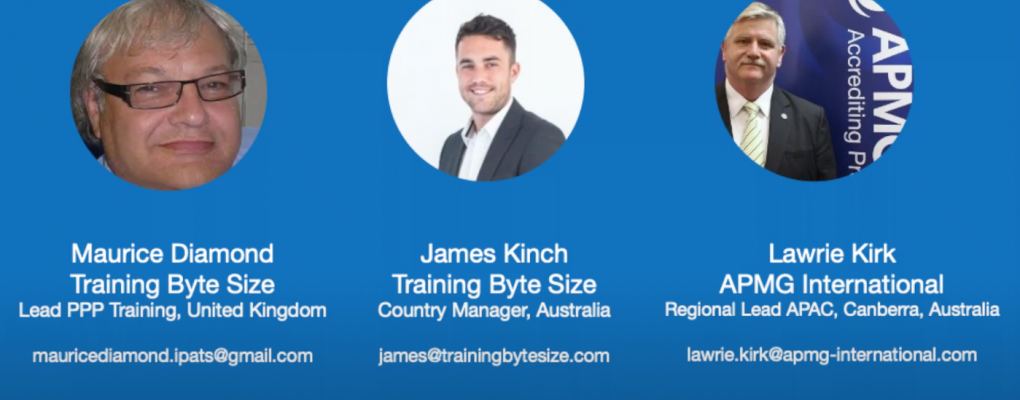
Interested in expanding your career into PPPs? This episode of APMG Midday Mentors is hosted by Lawire Kirk, Regional Lead APAC at APMG, and features guests James Kinch, Country Manager (Australia) of Training Byte Size, and Maurice Diamond, Lead PPP Training of Training Byte Size. Together they discuss how the need for Government and the private sector to work together is increasing, particularly when global resources are scarce, and how Private Public Partnerships (PPPs) are emerging as a way for this collaboration to be achieved.
Click here to watch on YouTube
Connect with James Kinch | https://www.linkedin.com/in/james-kin...
Connect with Maurice Diamond | https://www.linkedin.com/in/maurice-d...
Find out more about the CP3P certification | https://ppp-certification.com/

Alicia Holbrook
As Head of Marketing for APMG International I work closely with the World Bank Group, the MDB's and the PPIAF to help PPP professionals access best practice information.

CP3P is the definitive credential for PPP professionals
Over 7000 candidates from 167 countries are now APMG Certified Public-Private Partnership (CP3P) professionals, and more than two million visitors have accessed the PPP Guide.
The PPP Guide, which was authored and reviewed by 100 contributors from the global PPP community, is a comprehensive source of information for professionals who need best practice advice across the full PPP lifecycle. The PPP Guide is free to access and uses principles and models to convey knowledge across a range of subjects including planning and funding, tendering, contracts, operating and maintaining projects.
Why is CP3P certification important?
The financial impact of COVID-19 means that governments are likely to require more support from the private sector. With this increased requirement for borrowing and scarcity of resources, organisations want to be confident that they are hiring professionals with the competencies to structure investment-ready PPPs. The CP3P program and PPP Guide provide professionals with the tools to build capacity and deliver.
What are the challenges for CP3P in 2021?
The recently published World Bank Benchmarking Infrastructure Development 2020 summarises that the preparation phase of PPPs requires the most development. One of the barriers identified by the private sector is the lack of well-prepared projects which they can consider for investment.
The majority of PPP professionals only study at the foundation level. In order for PPPs to succeed there is an urgent need for professionals to enhance their skills in the preparation phase.
“The CP3P Preparation certification provides professionals with an understanding of the main tasks of identifying projects and preparatory activities to move forward in the PPP cycle. This includes how to draft the scope of a PPP, how to allocate institutional responsibilities for developing and procuring PPPs, and tendering best practice,” says Richard Pharro, CEO APMG International.
CP3P certified professionals are globally recognised as having the skills and knowledge to work on the full lifecycle of a PPP, from tendering and awarding the contract, to strategic delivery and commissioning—and finally operations and handback.
CP3P is a global program
There has been a strong global demand for training across the PPP lifecycle from organisations including private banks, government departments and construction companies. APMG Accredited Training Organisations have trained candidates working for a variety of organisations including Indonesia’s Ministry of Finance, the Government of Bermuda, the International Trade Center, Guateng Infrastructure Financing Agency, Bangladesh’s Road and Highway Department, and VIVEKA.
Exams have been sat in 167 countries. Top countries are:
- Brazil
- Republic of Korea
- South Africa
- USA
- Indonesia
- Nigeria
- India
- Spain
ENDS
About the APMG Certified Public-Private Partnership (CP3P) Program
CP3P and the PPP Guide can improve the quality of PPPs worldwide. PPP professionals around the world can access specialized knowledge and achieve a certification from a globally recognized program.
By helping to build a sounder knowledge around the management of PPPs as an option for governments to deliver basic infrastructure needs, the program intends to build capacity and knowledge access of professionals that are or will be working in their countries’ respective PPP programs, from government officials or their advisors.
The APMG PPP Certification Program is an innovation of the World Bank Group, the Asian Development Bank, the European Bank for Reconstruction and Development, the Inter-American Development Bank, the Islamic Development Bank, and partly funded by the Public-Private Infrastructure Advisory Facility with a shared vision of enhancing PPP performance globally.
Exams have been taken from candidates in over 167 countries and there are over 25 Accredited Training Organisations delivering the APMG PPP Certification Program. Exams are available in English, Brazilian Portuguese, Chinese, French, Japanese, Serbian and Spanish. Exams can be taken remotely online or in a classroom.
For more information please visit: https://ppp-certification.com/

Alicia Holbrook
As Head of Marketing for APMG International I work closely with the World Bank Group, the MDB's and the PPIAF to help PPP professionals access best practice information.

A new Climate-Resilient Infrastructure program has been developed by the Global Centre on Adaptation, with support from the Ministry of Infrastructure and Water Management of the Netherlands and in close partnership with the World Bank Group (WBG), the African Development Bank (AfDB), Asian Development Bank (ADB), European Bank for Reconstruction and Development (EBRD), Global Infrastructure Facility (GIF), Inter-American Development Bank (IDB), the Islamic Development Bank (IsDB), the Public-Private Infrastructure Advisory Facility (PPIAF), and UNOPS.
The program is intended to help build the upstream capacity of PPP practitioners to integrate climate resilience into infrastructure PPPs. Best practice support available includes the Climate-Resilient Infrastructure Officer Handbook, which is free to download, and a free online training course.
To become a certified Climate-Resilient Infrastructure Officer professionals will need to pass an online exam which is available from APMG International.
Learning Outcomes of the Climate-Resilient Infrastructure Officer program
The Climate-Resilience Infrastructure Officer certification is highly relevant for PPP professionals who want to make a positive impact. “APMG International developed this unique certification with GCA to provide professionals with the skills and knowledge to offer advice and deliver sustainable infrastructure projects using Nature-based Solutions. This certification will help professionals stay current and validate the skills needed to work on sustainable projects,” says Richard Pharro, CEO, APMG Group.
What you will learn:
• Understand key concepts around climate adaptation, risk and resilient infrastructure
• Identify the tools and capacity needed to enhance the resilience of infrastructure
• Articulate key policies governing climate adaptation, as well as financing and funding mechanisms for resilient infrastructure
• Understand the key interventions points to integrate climate resilience across the PPP project cycle
Supporting PPP practitioners to integrate climate resilience into infrastructure PPPs
Commenting on the launch, Patrick Verkooijen, CEO of the Global Center on Adaptation said: “The lack of resilient infrastructure harms people and economies. The launch of the Climate-Resilient Infrastructure Officers Program is an important step in building the capacity of public-private partnerships practitioners around the world as GCA continues to work with countries and partners to drive investment into resilient infrastructure on the ground.”
Imad Fakhoury, Global Director for Infrastructure Financing, PPPs and Guarantees at the World Bank said: “Service disruptions seriously undermine people’s safety and their very lives – in addition to affecting economies. The World Bank is making sure that climate adaptation is at the center of development discussions and that green, resilient and inclusive development is baked into infrastructure plans from the beginning.”
The Knowledge Module on Public-Private Partnerships is accessible to infrastructure planners, project developers, public contracting authorities and infrastructure financing institutions around the world directly involved in PPP projects. Through a reference handbook, an online course, PPP practitioners will be able to gain credentials as Climate-Resilient Infrastructure Officers through a certification exam with certification partner, APMG International.
The Global Center on Adaptation Infrastructure & Nature-Based Solutions Program in Africa and Asia will supplement the CRIO Program by providing targeted technical assistance and analytical support to assess and integrate climate resilience into PPP projects. This complements the work of the Public Private Infrastructure Advisory Facility of the World Bank which is investing millions in advisory resources in the coming years to benefit country partners by strengthening their ability to plan for resilience.
For more information about the Climate-Resilient Infrastructure Officer program visit: https://apmg-international.com/product/climate-resilient-infrastructure-officer-crio-certification
About the Global Center on Adaptation
The Global Center on Adaptation (GCA) is an international organization which works as a solutions broker to accelerate action and support for adaptation solutions, from the international to the local, in partnership with the public and private sector, to ensure we learn from each other and work together for a climate resilient future. Founded in 2018, the GCA is hosted by the Netherlands, working from its headquarters in Rotterdam with a knowledge and research hub based in Groningen. The GCA has a worldwide network of regional offices in Abidjan, Ivory Coast; Dhaka, Bangladesh and Beijing, China. Through this evolving network of offices and global and regional GCA teams, the organization engages in high-level policy activities, new research contributions, communications, and technical assistance to governments and the private sector.
About the Public Private Infrastructure Advisory Facility of the World Bank
PPIAF is the only global facility dedicated to building institutions in developing countries that set the stage for private participation in infrastructure and enabling finance for sub-national entities. The Public-Private Infrastructure Advisory Facility (PPIAF) helps developing-country governments strengthen policy, regulations, and institutions that enable sustainable infrastructure with private-sector participation. As part of these efforts, PPIAF promotes knowledge-transfer by capturing lessons while funding research and tools; builds capacity to scale infrastructure delivery; and assists sub-national entities in accessing financing without sovereign guarantees. Donor-supported and housed within the World Bank, our work helps generate hundreds of millions in infrastructure investment. While many initiatives focus on structuring and financing infrastructure projects with private participation, PPIAF sets the stage to make this possible.
About the APMG PPP Certification Program
The APMG PPP Certification Program and the PPP Guide will benefit PPP practitioners and can improve the quality of PPPs worldwide, while PPP professionals around the world can benefit from this opportunity to access this specialized knowledge and achieve a certification from a globally recognized program.
By helping to build a sounder knowledge around the management of PPPs as an option for governments to deliver basic infrastructure needs, the program intends to build capacity and knowledge access of professionals that are or will be working in their countries respective PPP programs, from government officials or their advisors.
The APMG PPP Certification Program is an innovation of the Asian Development Bank (ADB), the European Bank for Reconstruction and Development (EBRD), the Inter-American Development Bank (IDB), the Islamic Development Bank (IsDB), the World Bank Group (WBG) and part funded by the Public-Private Infrastructure Advisory Facility (PPIAF) with a shared vision of enhancing PPP performance globally.

Alicia Holbrook
As Head of Marketing for APMG International I work closely with the World Bank Group, the MDB's and the PPIAF to help PPP professionals access best practice information.

Congratulations to all the CP3P professionals who have worked hard to achieve their certification.
The CP3P Scheme is an innovation of the World Bank and has grown from strength to strength over the past five years. The PPP Guide has become the go-to body of knowledge for thousands of PPP professionals across the globe. Now available in nine languages, the PPP Guide has been accessed over a million times. We believe that the program has changed the way PPPs are executed. Find out more about the program highlights by watching the video.

Alicia Holbrook
As Head of Marketing for APMG International I work closely with the World Bank Group, the MDB's and the PPIAF to help PPP professionals access best practice information.
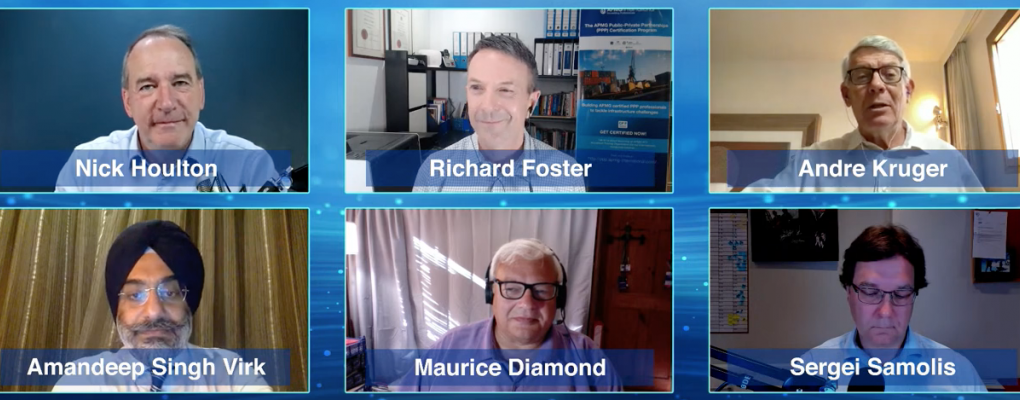
Each week APMG International runs a live show called 'Level up your Career' which is streamed on LinkedIn and Youtube. It's free to join and is a great opportunity to present your questions directly to thought leaders and seasoned industry professionals, all of whom have been selected to provide help and guidance to the community.
Our latest Level up your Career episode explores 'The winning formula for PPPs.' A huge thanks to our pannelists for their thoughts and expertise.
Panelists
Amandeep Singh Virk, Leading International PPP Transaction Advisor, The World Bank
Andre Kruger, Chief Operating Officer, PPP Training Online
Richard Foster, Director, Foster Infrastructure
Sergei Samolis, CEO, PPP Expertise Eurasia
Maurice Diamond, CP3P Tutor and Coach, IPATS Ltd
Your Hosts
Host: Nick Houlton, APMG-International
Question Master Suchitra Jacobs, APMG International
Click on the links below to access the question on YouTube
0:00:00 Introduction
0:01:51 Meet the Panelists
0:06:44 Should governments develop a long-term plan (+/-10 years) that includes a project list of projects to be procured on a traditional or PPP basis?
0:15:26 With expanding public debt in many countries PPPs seem like the answer, but when is a PPP structure not advisable?
0:25:03 Should a government have a PPP law in place to ensure the project's attraction to bidders and is PPPs law similar to governance or part of it?
0:32:48 Some developing countries are embracing visions for 2030, what is the key role of PPPs for such visions?
0:40:47 Do you have any guidance for how to mitigate the risk of corruption?
0:49:52 What is your key piece of advice for ensuring the success of a PPP?
0:56:58 Closing thoughts
1:03:22 The Next APMG Level Up Show
If you would like to be a pannelist on a future show, or have a have a question please contact us - we would love to hear from you!

Alicia Holbrook
As Head of Marketing for APMG International I work closely with the World Bank Group, the MDB's and the PPIAF to help PPP professionals access best practice information.

Ukraine has been working since 2017 to build its capacity to implement public-private partnerships (PPPs). The PPP Guide and APMG PPP Certification Program (CP3P) has been integral to help PPP professionals develop best practice skills and knowledge to deliver a pipeline of quality and sustainable projects in social and economic infrastructure.
To strengthen Ukraine’s capacity to structure and implement sustainable PPPs, Chapter 1 of the APMG PPP Certification Program Guide and Foundation level exam has been translated into Ukrainian.
The impact of the war in Ukraine has triggered a massive humanitarian crisis that has devastated lives and destroyed vital infrastructure. Reconstruction and recovery efforts will require billions of dollars, and PPPs will play a significant role in bringing together resources and expertise from the public and private sectors.
The APMG PPP Certification Program is an innovation of the Asian Development Bank (ADB), the European Bank for Reconstruction and Development (EBRD), the Inter-American Development Bank (IDB), the Islamic Development Bank (IsDB), and the World Bank Group and part-funded by the Public-Private Infrastructure Advisory Facility (PPIAF). This new translation, facilitated by the International Finance Corporation (IFC), part of the World Bank Group, will further support PPP practitioners in Ukraine by equipping them with knowledge and resources in their native language.
“This in-depth certification program builds on a vast pool of international experience in PPPs,” said Mehita Fanny, Regional Manager for IFC’s PPP Transaction Advisory Services in Europe. “Adopting internationally recognized good practices will help national and municipal governments in Ukraine effectively deliver projects that will attract qualified investors and support both long-term development priorities as well as national recovery efforts.”
"Being able to study in one’s native language is critical for capacity building. The team we worked with to bring the translation to market were enthusiastic and dedicated and I very much hope the Ukranian translation will provide help and support to local PPP professionals seeking best practice guidance,” said Richard Pharo, CEO of APMG International.
The Ukrainian PPP Guide Chapter 1 is a free downloadable body of knowledge to help candidates prepare for the APMG PPP Foundation level exam and represents a good knowledge resource for all elements of the PPP cycle, including financial models and best contracting practices. Over 1.25 million visitors have accessed the guide across all its language versions.
The APMG PPP Certification Program is an international success, with CP3P certified professionals in over 112 countries.

Alicia Holbrook
As Head of Marketing for APMG International I work closely with the World Bank Group, the MDB's and the PPIAF to help PPP professionals access best practice information.

Since 2004, Brazil have steadily introduced an impressive number of Public-Private Partnership (PPP) projects to combat the effect of the financial crisis in the early 2000s. This progression has enabled Brazil to better manage public interests and services by private investors. The steady incline of PPP initiatives from the early to mid-2000s is reflected in the World Bank’s report, listing Brazil as not only being in the top five EDME countries during the mid-2000s, but taking the number one spot. The World Bank also stated that the socioeconomic progress of Brazil between 2003 and 2014 lifted 29 million people out of poverty.
However, according to the latest 2017-2020 Global Competitiveness Report by the World Economic Forum, Brazil is ranked 80th out of 137 countries, which arguably does not reflect the potential of a country of this scale. As such, there exists scope for PPP professionals to help Brazil return to growth and reach its full socioeconomic potential.
Angola is a fast-growing and resource rich region that has developed dramatically since the civil war. Angola have experienced a strong growth in the Public Private Partnership sector. Aptly, their transport sector is undergoing nothing short of a revolution—since 2002, road, rail, sea, and air links have been upgraded and rebuilt across the country. There is, however, a need to connect the provinces on a logistical level to allow commerce and growth to thrive—and diminish the inequality currently prevalent in the more rural areas of the country. Thus, there is an increasing demand for PPP professionals to help implement the projects required to help achieve equality.
The PPP Guide and APMG PPP Certification Program (CP3P) has been integral to help PPP professionals develop best practice skills and knowledge to deliver a pipeline of quality and sustainable projects in social and economic infrastructure. To strengthen Angola and Brazil’s capacity to structure and implement sustainable PPPs, Chapters 2 to 5 of the APMG PPP Guide and the Preparation exam has been jointly translated into Portuguese by the IDB and the World Bank.
The APMG PPP Certification Program is an innovation of the Asian Development Bank (ADB), the European Bank for Reconstruction and Development (EBRD), the Inter-American Development Bank (IDB), the Islamic Development Bank (IsDB), and the World Bank Group and part-funded by the Public-Private Infrastructure Advisory Facility (PPIAF). This new translation, facilitated by the InterAmerican Development Bank (IDB), will further support practitioners by equipping them with knowledge and resources in their native language.
Richard Pharro, CEO, APMG International quote:
The World Bank Group and IDB’s leadership in translating the CP3P guide into Portuguese will be of great benefit to the large number of project professionals who will be required for the wide range of infrastructure projects in the Portuguese speaking world. Project success depends on qualified and committed teams so this initiative will accelerate capacity building especially in Brazil and Angola. We are delighted to be able to support them in their ambitions.
Gaston Astesiano, PPP Single Window Heat IDB quote:
“For the IDB, the CP3P guide in Portuguese is a tool of great importance; it not only allows us to standardize the knowledge on PPP in the region, but also to ensure the preparation of teams with the necessary knowledge for the adequate implementation of these projects. The Portuguese translation of this guide in its Preparation level, will allow CP3P reach the largest PPP market of the developing world, Brazil, and the rest of the Portuguese speaking nations. This is just another example of the IDB Group PPP Single Window commitment to continue providing to the LAC region the most updated knowledge and best practices for the successful implementation of PPP Programs and Projects.”
The Portuguese PPP Guide is a free downloadable body of knowledge to help candidates prepare for the APMG PPP Foundation and Preparation level exams and represents a good knowledge resource for all elements of the PPP cycle, including financial models and best contracting practices. Over 1.25 million visitors have accessed the guide across all its language versions.
The APMG PPP Certification Program is an international success, with CP3P certified professionals in over 112 countries.

Alicia Holbrook
As Head of Marketing for APMG International I work closely with the World Bank Group, the MDB's and the PPIAF to help PPP professionals access best practice information.

